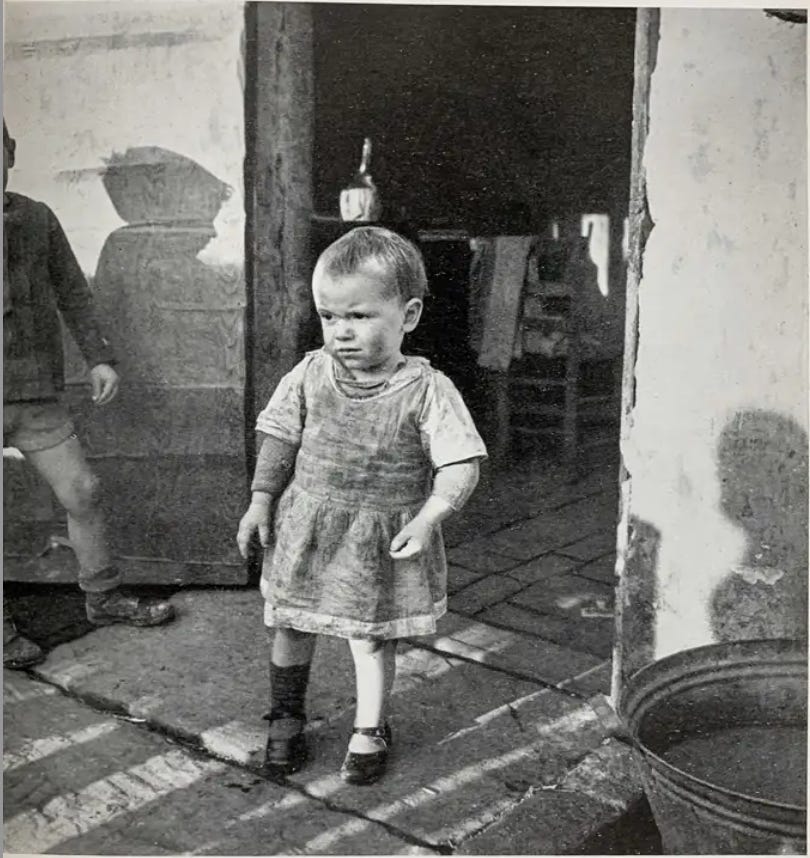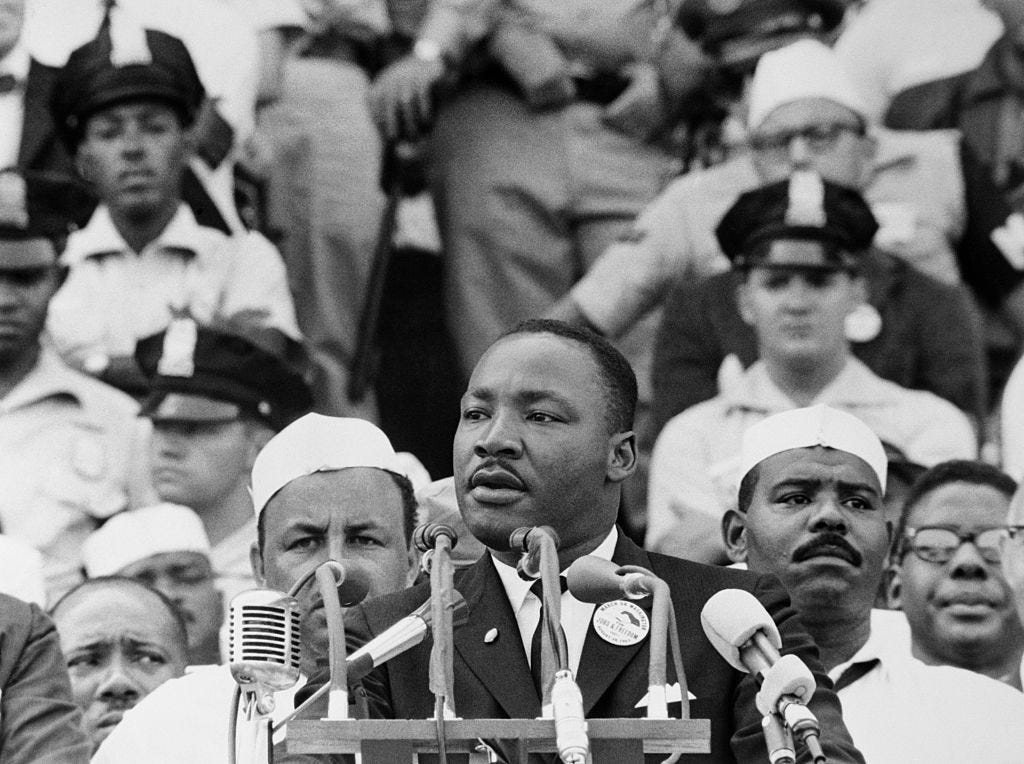We Know What Hate Can Do. It's Time to Invest in Love
Reflections occasioned by my new Los Angeles Times op-ed on love's political role in fraught times
Years ago, while doing research for my first book on Fascism, I came upon a text written in 1941 by the young filmmaker Alberto Lattuada, who had grown up with Benito Mussolini's regime and saw first-hand the toll it had taken on Italian society. His words seemed to get to the heart of the social and psychological costs of dictatorship, and they have stayed with me and shaped my work:
“The absence of love brought many tragedies that might have been averted. Instead of the golden rain of love, a black cloak of indifference fell upon the people. And so people have lost the eyes of love and can no longer see clearly…Here are the origins of the disintegration of all values and the destruction and sterilization of conscience: It is a long chain that is anchored at the devil’s feet.”
My essay on the power of love as a tool to resist autocracy, which was just published by the Los Angeles Times, starts with this quote by Lattuada, who was seven when Fascism started and 31 when Il Duce died. Lattuada understood that the regime sought to train people not to care about the fates of their compatriots, and he was always pushing the boundaries of Fascist censorship to keep humanitarianism and “the eyes of love “ (italics are his) alive.
Lattuada showed Jean Renoir's pacifist work, The Grand Illusion (1937), which was banned in Italian cinemas, to his Fascist University Youth group, and in 1941 published L'Occhio quadrato, a book of photographs that showed the poverty of wartime Milan. The quote comes from the introduction to the book, which was promptly banned by Fascist censors and appeared only after the regime was defeated.

America stands at the opposite end of autocracy's arc. We're not living through authoritarianism’s horrific climax, but rather witnessing its methodical preparation. While the United States of 2024 is vastly different than 1941 Italy, the goal of engineering moral collapse and an "absence of love" through cultivated cruelty and propaganda that fogs heads and hearts with lies and enmity may seem familiar.
In the coming weeks and months, I will be making the case for love's relevance as part of an anti-authoritarian politics that has produced results abroad and deserves a hearing in America, regardless of how the 2024 election turns out.
To that end, I wanted to share my argument in the Los Angeles Times piece: "Love seems scarce again today as autocracy spreads across the globe, and...authoritarian leaders seek to break bonds of solidarity among those they govern, replacing them with intimidation and hostility. Former President Donald Trump, who aspires to join their ranks, has followed a similar playbook to make America’s emotional and social climate propitious for autocracy."
"But love remains a potent anti-authoritarian force," I wrote, pointing out its success in Turkey and Poland as part of pushing back against tyranny.
"Love insists that we are precious beings who deserve leaders who respect us and promote our well-being, not tyrants who deceive, rob, jail and kill us. Love supports resistance in places where freedom has been lost, and it can also help endangered democracies like our own to reverse course."
"A national campaign that explicitly elevates solidarity, kindness, tolerance and empathy as core values of a multiracial democracy — and presents policies grounded in care and compassion — is likely to resonate with many voters. Along with joy and optimism, hallmarks of Vice President Kamala Harris’ campaign, love can sustain an American pro-democracy movement."
I recognize that love is a hard sell in America. When Senator Cory Booker made "radical love" a plank of his 2020 presidential campaign platform, hoping that "common interests and common pain" could prevail over polarization, his message had little traction.
And while bell hooks observed that love is an action as well as a feeling, it has often been dismissed as too cringey or awkward or abstract. Those who espouse love in highly polarized environments can seem idealistic or naive. "Glad I never went to NYU. You’re a real lunatic," is one of many negative messages I have received from both ends of the political spectrum since my piece appeared.
In fact, viewing your adversaries with "eyes of love" and listening to them attentively does not mean you are a sentimentalist or deluded. Rev. Dr. Martin Luther King, Jr., Rev. Dr. William J. Barber II, and other advocates of love who come from the American civil rights movement have always been clear on this point. Meeting others where they are on their political journey, and adopting an attitude that "does not seek to defeat or humiliate the opponent but to win his friendship and understanding," in Dr. King's words, can be a pragmatic move and is a basis of bridge-building.
Authoritarians may see love as a sign of weakness, but those who resist them know that bringing love into politics is also one of the most courageous things one can do.
That is why we find love included in resistance philosophies and alternate visions of government where tyranny and violence currently reign. Those embracing love in such difficult circumstances have often felt the hand of hatred and state repression and cannot be accused of being ingenuous or naive.
Take Svetlana Tikhanovskaya. She became the head of the Belarusian opposition after her husband, Siarhei, was put in prison for running against despot Alexander Lukashenko, in power for thirty years. She chose “We love, we can, we’ll win” as the slogan of the 2020 electoral campaign. She lives in exile, but her fight is far from concluded.

The Women of Zimbabwe Arise movement (WOZA) activists who contested strongman Robert Mugabe, another strongman who was in power for three decades, did not choose their mantra casually. "The power of love can conquer the love of power," brought optimism, solidarity, and caring to the resistance.
WOZA was inspired, in part, by the ideas and practice of Dr. King, who had to come to terms with his own skepticism about love as he started his journey of social justice in the American South 70 years ago. As Dr. King wrote, he "despaired of the power of love in solving social problems," but then heard Howard University President Mordechai Wyatt Johnson lecture on the work of Mahatma Gandhi. In the coming years, Dr. King brought traditions of Christian love and Gandhian conceptions of nonviolent protest as a "love-force" into powerful synergy.

Dr. King's teachings, and his model of "beloved community" offer a path forward for our polarized and injured country. “Along the way of life, someone must have sense enough and morality enough to cut off the chain of hate,” King wrote, tellingly and movingly using the same language as Lattuada to describe enmity’s ripple effects. “This can only be done by projecting the ethics of love to the center of our lives.”
It is our turn to cut off that chain of hate by reaching out to others in a spirit of openness and starting a conversation. Authoritarianism thrives when people lose hope that things can ever change. It can be risky and frightening to jump into the breach, but love can motivate others, give permission to others to start their journey out of hatred and division, and create new openings for dialogue and action, as a century of history shows.
We know all about what hate is doing to our country. It’s time to invest in love’s immense power.
References
Alberto Lattuada, Occhio quadrato, in Alberto Lattuada fotografo: Dieci anni di Occhio Quadrato, 1938–1948, edited by Piero Berengo Gardin (Florence: Alinari, 1982).
Dr. Martin Luther King, Stride Toward Freedom, 1958 (Boston, Beacon, 2010).




Love is creating jobs and opportunity in places where the majority of the population has been coerced into hating you. It totally blows up the narratives of the authoritarian. Love is kryptonite to fascists.❤️
We NEED this message of love and caring more than ever. Thank you so much, Ruth - or as my friends & I call you - RBG, reminding us of another warrior for justice